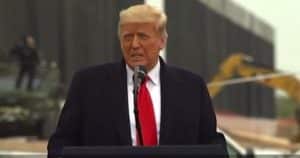Trump Grilled On Potential Preemptive Strike On Iran At Media Event
During a recent press conference at Mar-a-Lago, President-elect Donald Trump faced pointed questions about his views on preemptive military action against Iran and Israel's role in such scenarios.
Trump sidestepped queries regarding whether he would consider preemptive strikes against Iran, underscoring the sensitivity of military strategies.
The media session took place on Monday, with numerous reporters in attendance. One reporter's question about potential preemptive strikes by the U.S. against Iran prompted an evasive response from Trump. He challenged the propriety of discussing such sensitive topics publicly.
Trump Questions The Appropriateness Of Revealing Military Plans
"Well, I can't tell you that. I mean, it's a wonderful question, but how can I – am I going to do preemptive strikes? Why would I say that?" Trump responded when probed about his stance on preemptive military action.
This line of questioning continued as reporters pressed on the possibility of Israel's involvement in striking Iran. Trump remained non-committal, not directly addressing whether he would support such actions by Israel. Instead, he emphasized the impracticality of speaking on hypothetical military actions before they might occur.
Trump's Non-Committal Stance On Military Involvement
"Can you imagine if I said yes or no? You would say, ‘That was strange that he answered that way.’ Am I going to do preemptive strikes on Iran? Is that a serious question? How could I answer a question like that?" Trump elaborated on his previous comments, stressing the complexity of such issues.
Amidst the discussion of potential military operations, Trump also touched upon his administration's efforts in other areas. He mentioned initiatives aimed at securing the release of hostages in collaboration with Israel and other Middle Eastern nations.
Efforts To Resolve Hostage Situations And Regional Conflicts
"We're trying to help very strongly and getting the hostages back, as you know, with Israel and the Middle East," Trump said, highlighting ongoing diplomatic efforts beyond the military discussions.
Moreover, Trump spoke about the ongoing conflict in Ukraine, noting his administration's attempts to mediate and bring about peace. He described these efforts as part of his broader foreign policy strategy, acknowledging the challenging nature of the Ukrainian crisis.
"We're working very much on that. We're trying to get the war stopped, that horrible, horrible war that's going on in Ukraine with Russia. We've got a little progress. It's a tough one. It's a nasty one. It's nasty," Trump said, providing some insight into his administration's engagement in global conflict resolution.
Broader Implications Of Trump's Foreign Policy Strategies
The press conference at Mar-a-Lago offered a glimpse into the complexities of presidential decision-making in matters of international security and diplomacy. Trump's responses highlighted a cautious approach to public communications about potential military actions.
As the discussion concluded, Trump reiterated his commitment to non-disclosure of potential military plans, asserting that such matters are too sensitive to be publicly disclosed ahead of time.
"You don't talk about that before something may or may not happen. I don't want to insult you, I just think it's just not something that I would ever answer. Having to do with there or any other place in the world," concluded Trump, firmly sticking to his policy of keeping strategic military decisions under wraps.
The press conference underscored the ongoing challenges and strategic considerations facing the incoming administration, particularly in how it communicates and positions itself on the global stage concerning military and diplomatic engagements.




